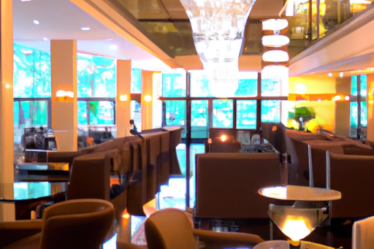
Impact of COVID-19 on Hotel Investment in Asia Pacific
The COVID-19 pandemic has had a significant impact on various industries around the world, and the hotel industry is no exception. In the Asia Pacific region, hotel investment has experienced slower growth in the first half of 2023. This slowdown can be attributed to the ongoing effects of the pandemic, which have created uncertainty and caution among investors.
One of the main factors contributing to the slower growth in hotel investment is the decrease in international travel. With travel restrictions and border closures still in place in many countries, the number of tourists visiting the Asia Pacific region has significantly declined. This decline in tourist arrivals has directly affected the demand for hotel rooms, leading to lower occupancy rates and reduced revenue for hotel owners. As a result, investors are hesitant to invest in new hotel projects or acquire existing properties.
Furthermore, the pandemic has also affected business travel, which is another important segment of the hotel industry. Many companies have implemented remote work policies and reduced their travel budgets, resulting in a decrease in corporate bookings. This decline in business travel has further impacted the profitability of hotels, making them less attractive for potential investors.
In addition to the decrease in demand, the pandemic has also disrupted the supply side of the hotel industry. Construction projects have been delayed or put on hold due to labor shortages and supply chain disruptions. This has led to a limited number of new hotel developments entering the market, reducing the investment opportunities available to investors.
Despite these challenges, there are still some bright spots in the Asia Pacific hotel investment landscape. Domestic tourism has seen a resurgence in many countries as people seek alternative travel options within their own borders. This has led to increased demand for hotels in popular domestic tourist destinations, presenting investment opportunities for those willing to tap into this market.
Furthermore, the rollout of vaccination programs in many countries has provided hope for the recovery of the hotel industry. As more people get vaccinated and travel restrictions are gradually lifted, it is expected that international travel will rebound, leading to an increase in hotel occupancy rates and revenue. This positive outlook may encourage investors to consider hotel investment opportunities in the Asia Pacific region.
In conclusion, the COVID-19 pandemic has had a significant impact on hotel investment in the Asia Pacific region. Slower growth in the first half of 2023 can be attributed to the decrease in international and business travel, as well as disruptions in the supply side of the industry. However, there are still opportunities for investment, particularly in domestic tourism and as the industry recovers with the rollout of vaccination programs. As the situation continues to evolve, it is important for investors to carefully assess the risks and opportunities in the hotel market and make informed decisions based on the changing landscape.
Changing Travel Patterns and their Effect on Hotel Investment in Asia Pacific

Slower Growth in Hotel Investment in Asia Pacific in H1 2023
The Asia Pacific region has long been a hotbed for hotel investment, with its booming tourism industry and growing middle class. However, recent data suggests that there has been a slowdown in hotel investment in the region during the first half of 2023. This can be attributed to changing travel patterns and their effect on the hospitality sector.
One of the key factors contributing to the slower growth in hotel investment is the shift in travel preferences among tourists. In the past, travelers from both within and outside the region flocked to popular tourist destinations, such as Bali, Phuket, and Tokyo. These cities were known for their vibrant nightlife, cultural attractions, and luxury accommodations. However, with the ongoing pandemic and the rise of remote work, people are now seeking out more secluded and nature-centric destinations.
This change in travel patterns has led to a decrease in demand for hotels in major cities, resulting in a decline in hotel investment. Investors are now looking to capitalize on the growing trend of eco-tourism and wellness retreats. Destinations like Bali and Phuket, which were once bustling with tourists, are now seeing a shift towards more remote and untouched locations, such as the Gili Islands and Koh Yao Noi. These areas offer a more serene and sustainable travel experience, attracting a different type of traveler.
Another factor influencing the slowdown in hotel investment is the rise of alternative accommodation options. The advent of platforms like Airbnb has disrupted the traditional hotel industry, providing travelers with more affordable and unique lodging options. This has led to a decrease in hotel occupancy rates and subsequently, a decrease in investor interest.
Furthermore, the pandemic has also had a significant impact on the hospitality sector. Travel restrictions and lockdown measures have severely affected the tourism industry, resulting in a decline in hotel bookings and revenue. Many hotels have been forced to close temporarily or operate at reduced capacity, leading to a decrease in investor confidence.
However, despite the challenges faced by the hotel industry, there are still opportunities for growth and investment. The rise of domestic tourism has provided a lifeline for hotels in the region. As international travel remains restricted, people are exploring their own countries and rediscovering local destinations. This has led to an increase in demand for hotels in smaller cities and rural areas, where travelers can experience the beauty and culture of their own country.
Additionally, the rollout of vaccination programs has instilled confidence in travelers, leading to a gradual recovery in the tourism industry. As more people get vaccinated, travel restrictions are being lifted, and international travel is slowly resuming. This will undoubtedly have a positive impact on hotel investment in the region, as tourists start to venture out and explore new destinations.
In conclusion, the slower growth in hotel investment in Asia Pacific during the first half of 2023 can be attributed to changing travel patterns and the impact of the pandemic. The shift towards nature-centric destinations, the rise of alternative accommodations, and the decline in international travel have all contributed to the decline in investor interest. However, with the rise of domestic tourism and the gradual recovery of the tourism industry, there are still opportunities for growth and investment in the hotel sector. As the world slowly returns to normalcy, the Asia Pacific region is poised to regain its status as a thriving hub for hotel investment.
Economic Factors Influencing Slower Growth in Hotel Investment in Asia Pacific
Slower Growth in Hotel Investment in Asia Pacific in H1 2023
The Asia Pacific region has long been a hotbed for hotel investment, with its booming tourism industry and growing middle class. However, recent data suggests that there has been a slowdown in hotel investment in the region during the first half of 2023. This article will explore the economic factors that have influenced this slower growth and shed light on the potential implications for the hospitality industry.
One of the key factors contributing to the slower growth in hotel investment is the global economic uncertainty. The ongoing trade tensions between major economies, such as the United States and China, have created a sense of caution among investors. The fear of a potential economic downturn has led many to adopt a wait-and-see approach, resulting in a decrease in hotel investment activity.
Furthermore, the rising interest rates in several countries within the Asia Pacific region have also played a role in the slower growth. Higher interest rates make borrowing more expensive, which in turn reduces the attractiveness of hotel investment. Investors are becoming more cautious about taking on additional debt, especially in an uncertain economic climate.
Another factor influencing the slower growth in hotel investment is the increasing competition from alternative accommodation providers. The rise of home-sharing platforms, such as Airbnb, has disrupted the traditional hotel industry. These platforms offer travelers a more affordable and flexible option, which has led to a decline in hotel occupancy rates. As a result, investors are becoming more hesitant to invest in new hotel projects, as the demand for traditional hotel rooms is not as strong as it once was.
Additionally, the changing demographics and preferences of travelers have also impacted hotel investment in the region. Millennials, who now make up a significant portion of the travel market, have different expectations when it comes to accommodation. They value experiences over material possessions and are more likely to seek out unique and authentic accommodations. This shift in consumer behavior has led to a rise in boutique hotels and other non-traditional lodging options, further reducing the demand for traditional hotel rooms.
The slower growth in hotel investment in the Asia Pacific region has several implications for the hospitality industry. Firstly, it may lead to a slowdown in the development of new hotels, particularly in areas where demand is not as strong. This could result in a shortage of hotel rooms in popular tourist destinations, potentially driving up prices and limiting options for travelers.
Furthermore, the slower growth in hotel investment may also impact job creation in the hospitality sector. With fewer new hotels being developed, there may be fewer opportunities for employment in the industry. This could have a ripple effect on the local economy, as the hospitality sector is often a significant source of employment and economic growth.
In conclusion, the slower growth in hotel investment in the Asia Pacific region during the first half of 2023 can be attributed to various economic factors. The global economic uncertainty, rising interest rates, competition from alternative accommodation providers, and changing traveler preferences have all played a role in this slowdown. The implications of this slower growth are far-reaching, affecting both the availability of hotel rooms and job creation in the hospitality sector. As the industry continues to evolve, it will be crucial for investors and hoteliers to adapt to these changing dynamics in order to thrive in the ever-competitive market.


